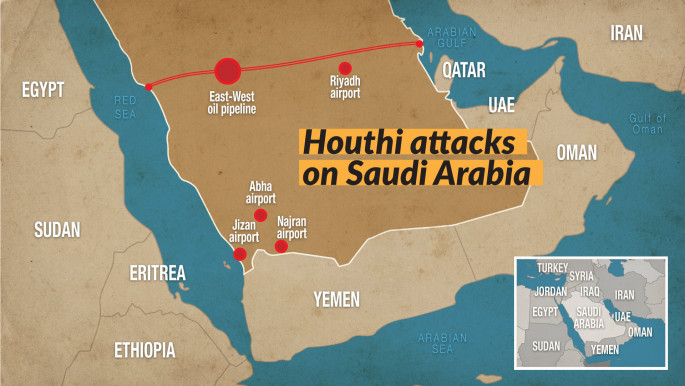MbS' brother Prince Khalid warns Iran of 'grave consequences' after Houthi attack
Prince Khalid, a son of King Salman and the brother of notorious Crown Prince Mohammed bin Salman unleashed a war-of-words with the Houthis in the aftermath of the attack, which he blamed on the Yemen rebels' "patrons" Iran.
"We will confront the Houthi militia's crimes with unwavering resolve. Their targeting of a civilian airport exposes to the world the recklessness of Iran's escalation and the danger it poses to regional security and stability," he tweeted.
"The continuation of the Iranian regime’s aggression and reckless escalation, whether directly or through its militias will result in grave consequences. The international community must carry out its responsibility to avoid this outcome."
Prince Khalid, the kingdom's deputy defence minister, slammed the Iranian regime for 40 years of "chaos, death and destruction, by sponsoring and financing terrorist organisations including the Houthis".
Riyadh has accused the rebels of being Iranian proxies ever since it led its allies in launching a military intervention against them in March 2015, but the rebel group has consistently denied those claims, alleging they are "independent in our decisions and ... we are not subordinated to anyone", Mohammed Ali al-Houthi, the president of the rebel's Supreme Revolutionary Committee said.
Shortly after Prince Khalid bin Salman's comments, Saudi-led coalition jets pounded Yemen's capital on Thursday, residents and the Houthi-run al-Masirah TV said, just a day after the military alliance vowed to respond to the Houthi attacks on the kingdom.
Read more: Middle East drone wars heat up in Yemen
The airstrikes targeted military camps west and north of the capital city, Reuters reported, with local media specifying 8 raids hit the Special Forces camp in the Sabahah area, while two others struck the Houthi-controlled Al-Siyana camp.
The coalition strikes came in response to a Houthi rebels attack on a civilian airport in the popular mountain resort of Abha in the southwest of the kingdom on Wednesday, damaging the arrivals hall and forcing its closure for several hours. At least 26 civilians were wounded in what the kingdom described as a "terrorist" attack, vowing to "take stern action" to deter the rebels and protect civilians.
At least 26 civilians were wounded in what the kingdom described as a "terrorist" attack, vowing to "take stern action" to deter the rebels and protect civilians.
The Houthis have increasingly targeted the kingdom with bomb-carrying drones and have rejected Saudi claims that their attacks are directed by Iran, instead blaming the attacks on Riyadh's rejection of peace initiatives in Yemen.
Last month the Houthis claimed several drone attacks targeting oil installations and airports in Saudi Arabia.
Read more: Houthis justify attacks on Saudi Arabia as 'response to spurned peace moves'
Houthi drone attacks briefly shut down a major oil pipeline in the kingdom, as well as allegedly targeting military installations at Najran airport.
Saudi Arabia confirmed the attacks but claimed the Houthis had attempted to strike civilian infrastructure at the airport.
Airports in the Middle East are frequently home to both civilian and military aviation bases.
The Saudi-led coalition responded to those drone strikes with its own airstrikes in Yemen that killed dozens, including children.
Last week, Houthi spokesman Yahya Sarei told the rebel-run SABA news agency that fighters crossed over the border to seize Saudi military positions in the kingdom's southwestern Najran province.
Houthi forces carried out a "surprise attack carried out along three separate axes" over a 72-hour period, Sarei said, claiming that 200 Saudi troops were killed in the offensives and that military equipment were seized by the rebels.
The Yemen conflict exacerbated after a Saudi-led coalition intervened in March 2015 to reinstate the Abedrabbo Mansour Hadi government after the rebels overran the capital and other major cities.
The conflict, which forced Hadi to relocate to Saudi Arabia, has killed tens of thousands people, many of them civilians, relief agencies say.
The fighting has triggered what the United Nations describes as the world's worst humanitarian crisis, with 24.1 million - more than two-thirds of the population - in need of aid.
Follow us on Twitter: @The_NewArab



